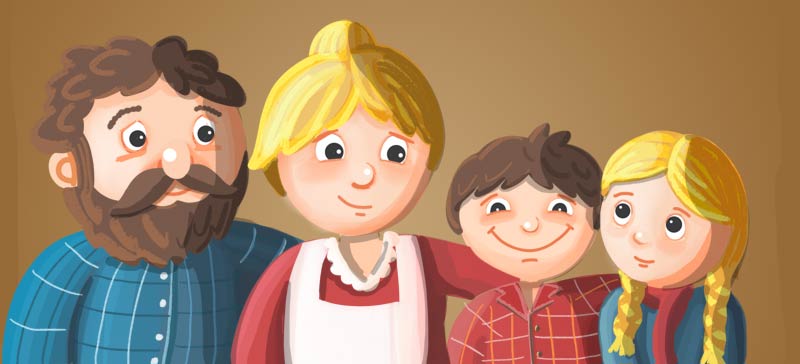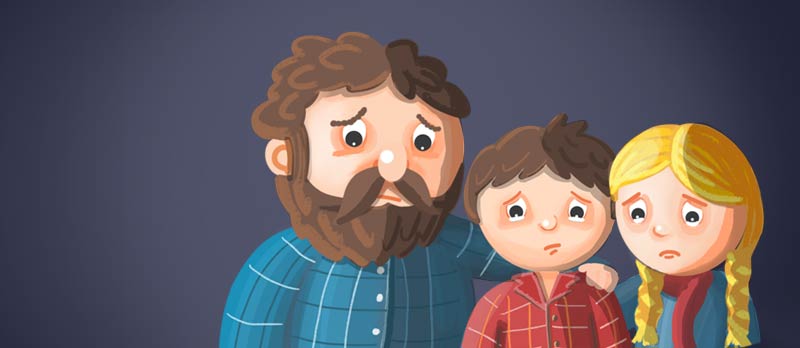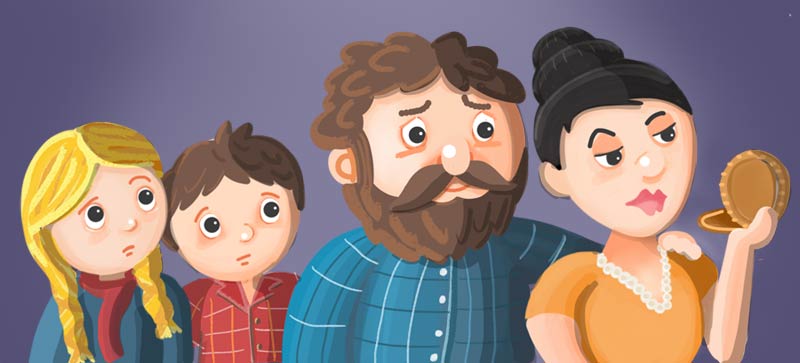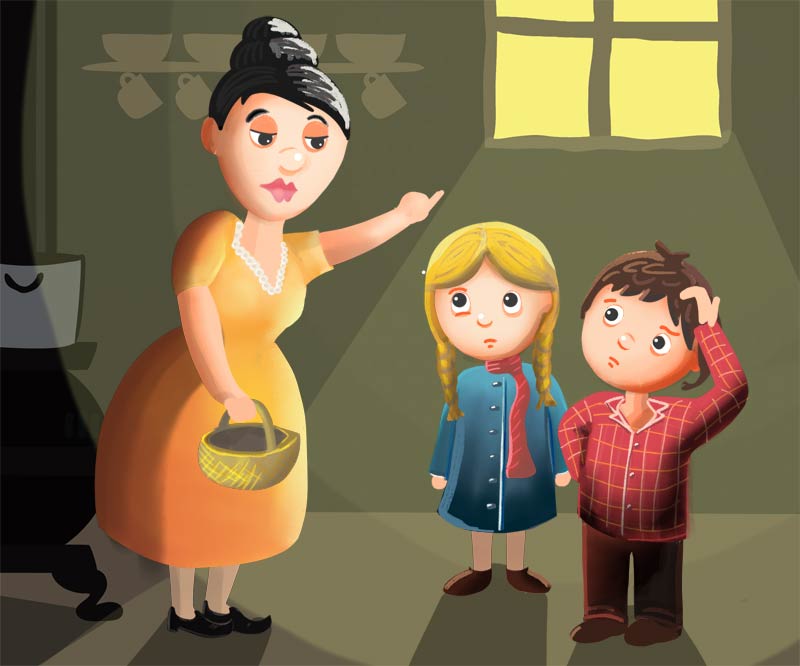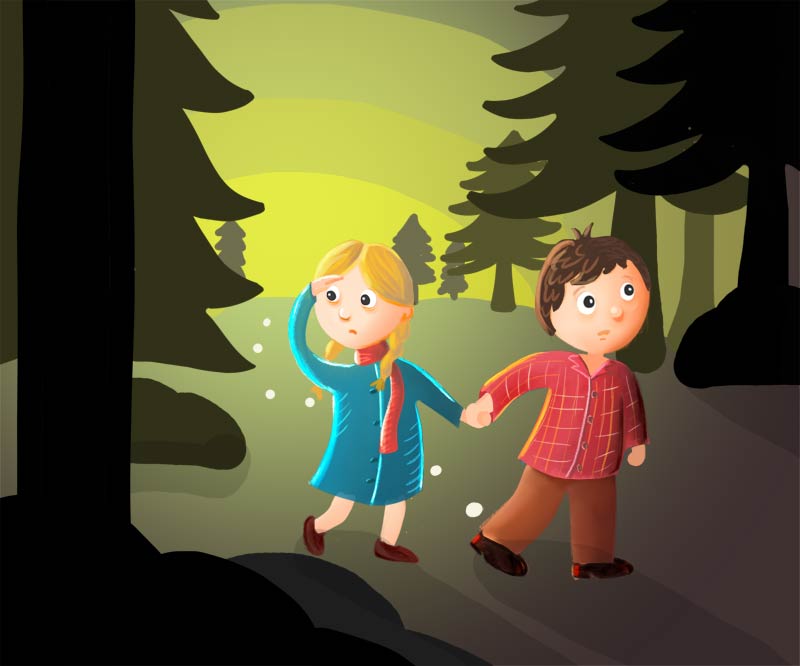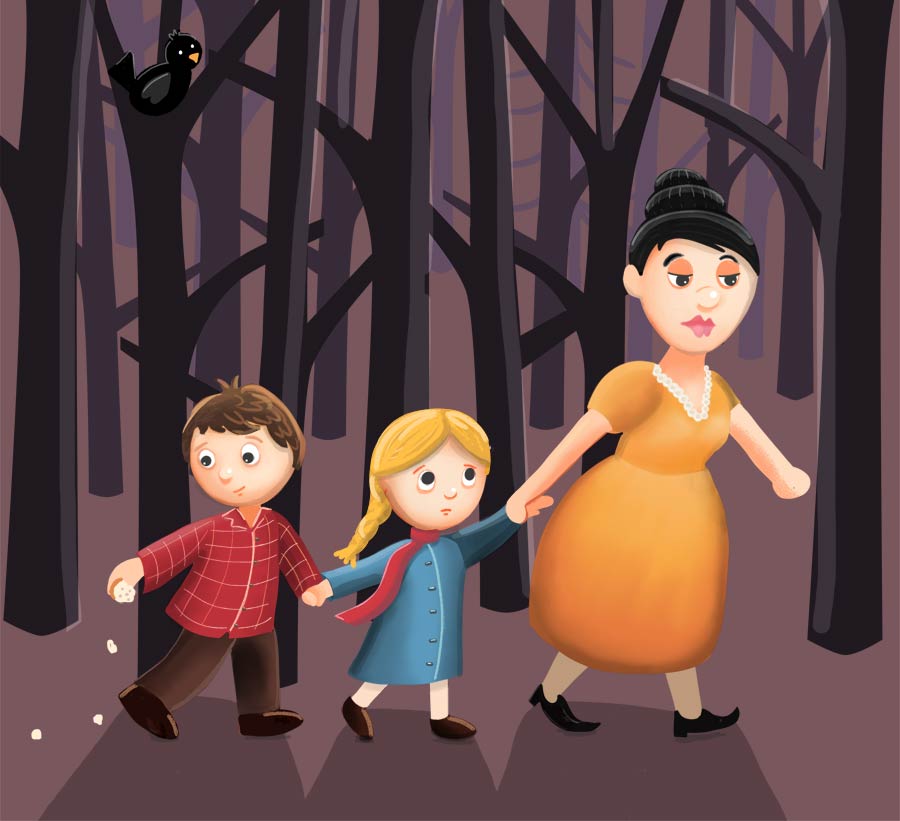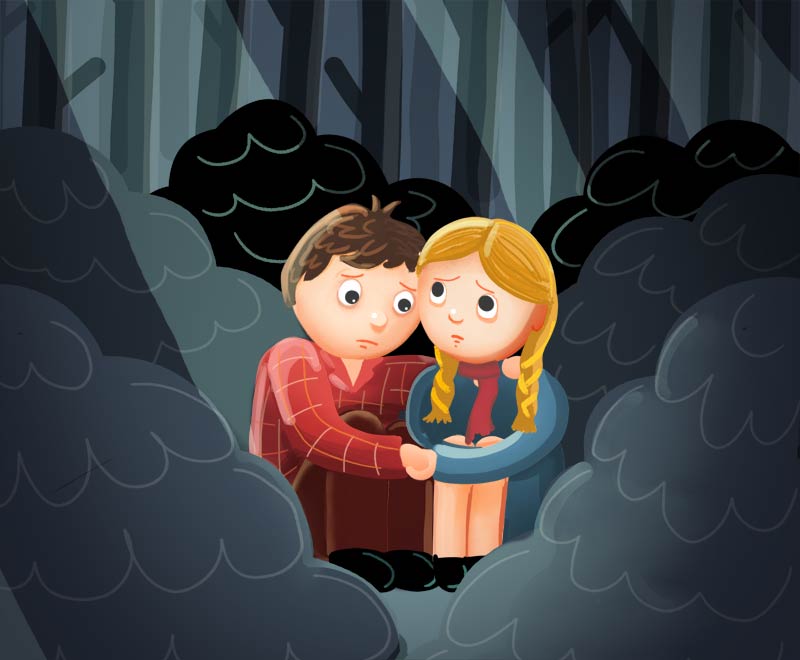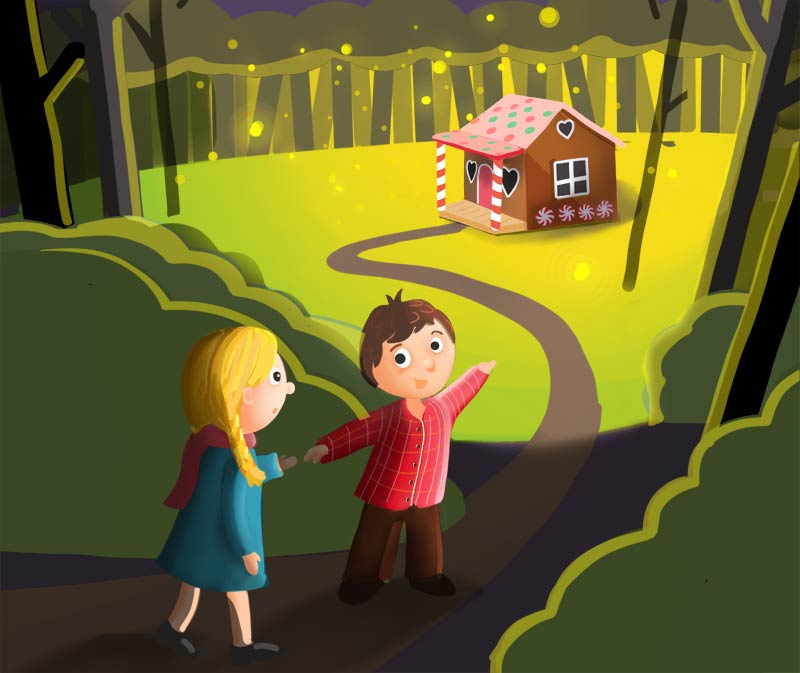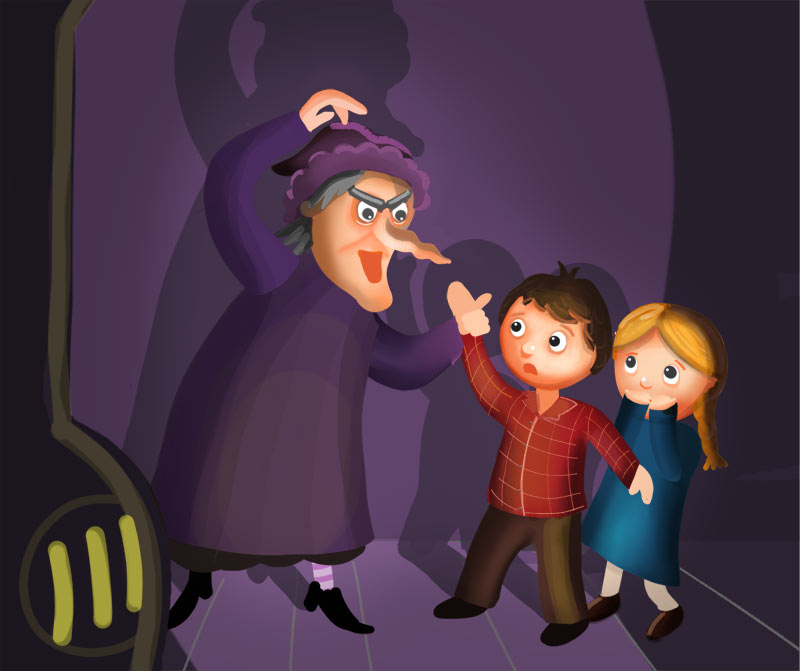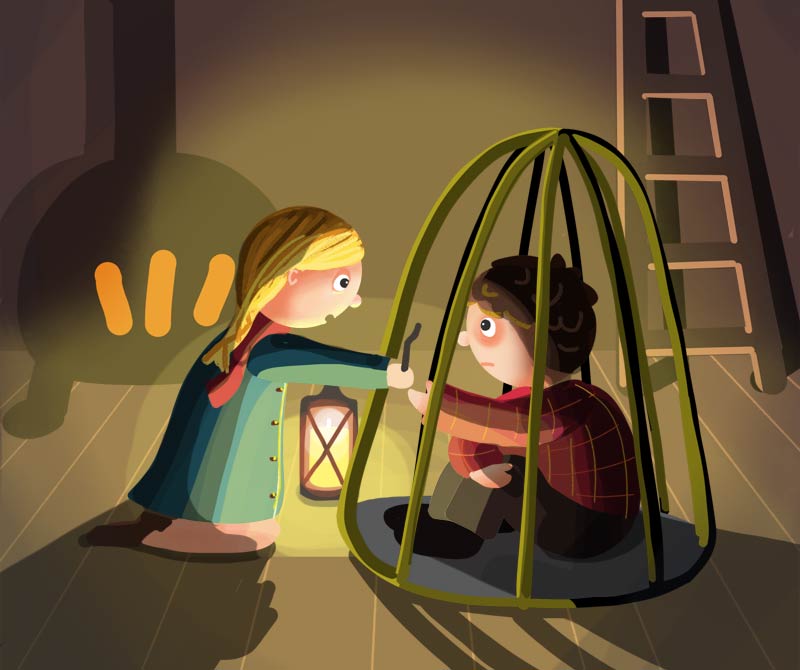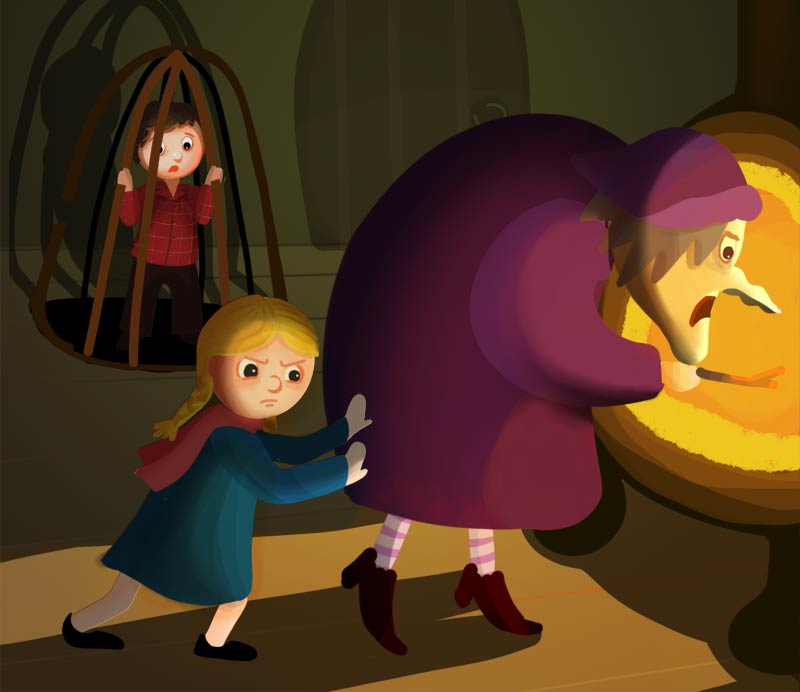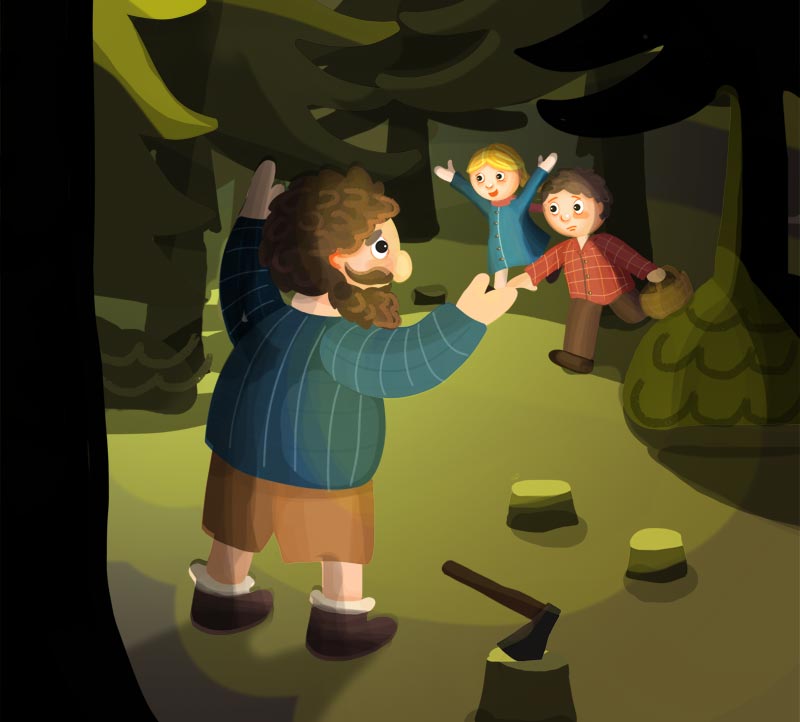Laissez-moi vous raconter l'histoire d'une famille : celle d'un aimable bûcheron, de sa gentille épouse et de leurs deux enfants, Hansel et Gretel. Ils vivent ensemble dans une petite maison au fond de la forêt.
Let me tell you the story of a family: that of a friendly lumberjack, his kind wife and their two children, Hansel and Gretel. They live together in a small house deep in the forest.
La famille n’a pas beaucoup d’argent mais leur maison est toujours chauffée et les enfants ont toujours de la soupe et du pain. Ils n’ont jamais faim.
The family does not have much money but their house is always warm (literally: heated) and the children always have soup and bread. They are never hungry.
Une année, alors que l’hiver est terriblement froid, la mère d’Hansel et Gretel tombe malade, puis meurt.
One year, when the winter is terribly cold, Hansel and Gretel's mother falls ill and then dies.
Après un certain temps, le bûcheron se remarie, mais sa nouvelle femme n’est ni aimable ni gentille. Elle est cruelle et égoïste.
After a while (literally: after a certain time), the woodcutter remarries, but his new wife is neither friendly nor kind. She is cruel and selfish.
Elle veut être riche. Et elle veut manger des plats élaborés comme le rôti de bœuf, la purée, les petits pois, le maïs, les gâteaux au citron et des fruits exotiques venant de pays ensoleillés.
She wants to be rich. And she wants to eat sophisticated dishes like roast beef, mash (i.e., mashed potatoes), peas, corn, lemon cakes and exotic fruits from sunny lands.
Elle est fâchée de ne pouvoir s’offrir que de la soupe et du pain à chaque repas.
« De la soupe et du pain ! De la soupe et du pain ! Chaque jour ! De la soupe et du pain ! J’en ai assez de la soupe et du pain ! », se plaint-elle.
She is angry that she can only afford soup and bread for every meal.
“Soup and bread! Soup and bread! Every day! Soup and bread! I've had enough (of) soup and bread!”, she complains.
La belle-mère est surtout cruelle envers Hansel et Gretel parce qu'elle pense que la famille est pauvre à cause d'eux.
The stepmother is especially cruel to Hansel and Gretel because she thinks the family is poor because of them.
« Vous, les enfants, vous mangez trop ! C’est à cause de vous que nous n’avons que de la soupe et du pain ! »
Elle veut que les enfants s’en aillent.
“You children eat too much! It's because of you that we have only soup and bread!”
She wants the children to go away.
Un jour, alors que le bûcheron est parti couper du bois, la belle-mère appelle Hansel et Gretel dans la cuisine de leur petite maison.
One day, when the woodcutter is out chopping wood, the stepmother calls Hansel and Gretel into the kitchen of their little house.
« Il n’y a pas assez de nourriture pour faire de la soupe au dîner, dit la belle-mère. Nous allons mourir de faim ce soir. Allez dans la forêt ramasser des champignons pour une soupe. Je sais où poussent les meilleurs champignons ... »
“There is not enough food to make soup for dinner,” says the stepmother. “We are going to starve (literally: die of hunger) tonight. Go to the forest to pick mushrooms for a soup. I know where the best mushrooms grow...”
Puis elle leur donne les indications les plus confuses qu’elle puisse imaginer. Elle sait qu’ils ne pourront jamais retrouver le chemin de la maison.
Then she gives them the most confusing directions she can think of. She knows they will never be able to find their way home.
« Marchez vers le Nord pendant deux heures, tournez à droite aux grands arbres, marchez vers l’Est pendant vingt minutes, continuez tout droit, traversez le ruisseau, tournez à gauche sur la route principale …
“Walk north for two hours, turn right at tall trees, walk east for twenty minutes, go straight, cross the stream, turn left on the main road...
… Passez par le trou dans la clôture, passez sous le pont (faites attention au troll) et puis allez sur cinq kilomètres dans la forêt, vous trouverez quelques champignons sous un arbre. Allez-y maintenant et vous pourrez être de retour pour le dîner. »
Go through the hole in the fence, go under the bridge (watch out for the troll) and then go five kilometres into the forest, you'll find some mushrooms under a tree. Go now and you can be back for dinner.”
Hansel et Gretel ont peur. Ils savent que la forêt est sombre et profonde, et qu’il est facile de s’y perdre.
« Ne t’inquiète pas ! J’ai un plan », murmure Hansel à Gretel.
Hansel and Gretel are scared. They know that the forest is dark and deep, and that it is easy to get lost in it.
“Don't worry ! I have a plan,” whispers Hansel to Gretel.
Il va à l’arrière de la maison et remplit ses poches avec des petits galets blancs du jardin. Puis les deux enfants se mettent en route, en suivant les indications de leur belle-mère. Tous les quelques pas, Hansel laisse tomber un petit galet blanc par terre.
He goes to the back of the house and fills his pockets with little white pebbles from the garden. Then the two children set off, following the directions of their stepmother. Every few steps, Hansel drops a small white pebble on the ground.
Ils marchent pendant des heures mais ne trouvent aucun champignon.
— Il fait presque nuit. J’ai peur, dit Gretel en pleurant.
— Ne t’inquiète pas. Je peux retrouver le chemin de la maison ! dit Hansel.
They walk for hours but they don’t find any mushrooms.
“It is almost dark. I'm scared,” Gretel says, crying.
“Don't worry. I can find the way home!” says Hansel.
Hansel attend que la lune brille. Le clair de lune se réfléchit sur les grands arbres et fait luire ses petits galets blancs. Ils suivent le tracé de galets jusqu’à la maison.
Hansel waits for the moon to shine. The moonlight reflects off the tall trees and makes its little white pebbles glow. They follow the pebble trail back to the house.
Leur belle-mère est furieuse. Elle ne s’attendait pas à ce que les enfants retrouvent le chemin de la maison.
Their stepmother is furious. She did not expect the children to find their way home.
« Petits cornichons ! Où sont les champignons ?, crie la belle-mère. Maintenant nous n’avons rien à manger ! Vous n’aurez pas de dîner ce soir ! Allez directement vous coucher ! »
Les enfants vont se coucher affamés.
“Little ninnies! (literally: little pickles!) Where are the mushrooms?" shouts the stepmother. “Now we have nothing to eat! You won't have dinner tonight! Go straight to bed!”
The children go to bed hungry.
Le lendemain matin, alors que le bûcheron est parti au travail, la belle-mère réveille les enfants.
The next morning, when the woodcutter is gone to work, the stepmother wakes the children.
« Réveillez-vous ! Réveillez-vous petits fainéants ! Aujourd’hui c’est l’anniversaire de votre père. Je veux lui faire une tarte aux pommes pour son dîner d’anniversaire. Allez dans la forêt chercher des pommes. Cette fois je viendrai aussi. Je sais où nous pouvons trouver un grand pommier. »
“Wake up! Wake up little lazybones! Today is your father's birthday. I want to make him an apple pie for his birthday dinner. Go to the forest to find some apples. This time I will come too. I know where we can find a big apple tree.”
Elle leur donne une miche de pain pour le déjeuner et les pousse par la porte. Hansel n’a pas le temps de ramasser des galets.
She gives them a loaf of bread for lunch and pushes them out the door. Hansel doesn't have time to pick up pebbles.
Mais le malin Hansel a un plan. Il ne mange pas son pain pour le déjeuner. Au lieu de ça, il le réduit en petites miettes. Tous les quelques pas, il laisse tomber une miette pour marquer le chemin.
But the clever Hansel has a plan. He does not eat his bread for lunch. Instead, he grinds it into small crumbs. Every few steps, he drops a crumb to mark the way.
Ils suivent leur belle-mère sur le chemin, puis dans un virage et à travers la forêt. « Plus loin ! Plus loin ! », dit la belle-mère.
Ils marchent loin dans la forêt. Ils tournent à gauche. Ils tournent à droite. « Plus loin ! Plus loin ! », dit la belle-mère.
They follow their stepmother up the path, then around a bend and through the forest. “Further! Further!” says the stepmother.
They walk far into the forest. They turn left. They turn right. “Further! Further!” says the stepmother.
Finalement ils s’arrêtent et la belle-mère s’assoit pour se reposer. Elle leur indique un coin très sombre de la forêt. « Le pommier est là-bas ! »
Eventually they stop and the stepmother sits down to rest. She points them to a very dark corner of the forest. “The apple tree is over there!”
Les enfants vont plus loin dans la forêt mais ne voient pas le pommier.
— Où ? demandent-t-ils.
— Juste un peu plus loin ! leur crie la belle-mère.
The children go further into the forest but do not see the apple tree.
“Where?” they ask.
“Just a little further!” the stepmother shouts to them.
Hansel et Gretel vont de plus en plus loin dans la forêt mais ils ne voient toujours pas le pommier.
— Où ? appellent-ils une deuxième fois.
— Juste un peu plus loin ! leur crie la belle-mère. Sa voix est maintenant très faible.
Hansel and Gretel go further and further into the forest but they still do not see the apple tree.
“Where?” they call a second time.
“Just a little further!” the stepmother shouts to them. His voice is now very faint.
Hansel et Gretel marchent et marchent de plus en plus loin. Pas de pommier.
— Où ça ? , appellent-ils une troisième fois.
Mais il n’y a pas de réponse de leur belle-mère. Elle est partie.
Hansel and Gretel walk and walk further and further. No apple tree.
“Where is it?”, they call a third time.
But there is no response from their stepmother. She is gone.
— Oh non ! Nous sommes perdus ! pleure Gretel.
— Ne t’inquiète pas, j’ai un plan, dit Hansel.
Il se retourne pour chercher les miettes mais elles ont disparu ! Les oiseaux affamés ont volé chaque miette de pain !
“Oh no ! We’re lost!” cries Gretel.
“Don't worry, I have a plan,” says Hansel.
He turns around to look for the crumbs but they are gone! The hungry birds have stolen every bread crumb!
— J’ai peur, pleure Gretel. Et j’ai froid et faim, et je veux rentrer à la maison !
— Ne t’inquiète pas. Tout ira bien, dit Hansel en essayant de paraître courageux. Mais il a peur aussi.
“I'm scared,” Gretel cries. “And I'm cold and hungry, and I want to go home!”
“Don't worry. It'll be fine,” says Hansel, trying to sound brave. But he is also afraid.
Cette nuit-là les enfants dorment dans des buissons doux pour rester au chaud.
That night the children sleep in soft bushes to stay warm.
Quand ils se réveillent, le soleil brille, les oiseaux chantent et il y a une odeur sucrée et délicieuse dans l’air.
— J’ai si faim, dit Gretel. Je crois que je sens des cookies ...
— Regarde ! dit Hansel en pointant du doigt. Une maison !
When they wake up, the sun is shining, the birds are singing, and there is a sweet, delicious smell in the air.
“I'm so hungry,” says Gretel. “I think I smell cookies…”
“Look!” says Hansel, pointing. “A house!”
C’est la maison la plus étrange qu’ils n’aient jamais vue. Les murs ressemblent à des cookies au citron. Les fenêtres ont l’air d’être faites de chocolat. Le toit semble être fait de bonbons verts et rouges.
It is the strangest house they have ever seen. The walls look like lemon cookies. The windows look like they are made of chocolate. The roof seems to be made of green and red candies.
Comme Hansel meurt de faim, il court vers la maison et arrache un bout du mur. « Ça a le goût d’un petit gâteau au citron ! », s’exclame-t-il.
Because Hansel is starving, he runs to the house and rips off a piece of the wall. “It tastes like a lemon cupcake!” he exclaims.
Gretel prend un morceau de fenêtre et le met dans sa bouche. « C’est du chocolat ! »
Les enfants ne peuvent pas s’arrêter de manger.
Gretel takes a piece of window and puts it in her mouth. “It's chocolate!”
The children cannot stop eating.
« Nous allons rester ici pour toujours ! », déclare Hansel, en croquant le porche fait de tarte à la pomme. Ils sont sur le point de goûter un morceau de la porte en bonbon violet lorsqu’elle s’ouvre en silence.
“We will stay here forever!” says Hansel, biting into the porch made of apple pie. They are about to taste a piece of the purple candy door when it silently opens.
« Bonjour ! », dit une vieille femme derrière la porte. « Les enfants, est-ce que vous aimez les sucreries ? J’en ai encore plus à l’intérieur ! Entrez ! Entrez ! N’ayez pas peur ! »
“Hello!” says an old woman behind the door. “Children, do you like sweets? I have even more inside! Come in! Come in! Do not be afraid!”
La vieille femme a l’air gentille et amicale, alors les deux enfants entrent.
Oh non ! Mauvaise idée ! La vieille femme n’est pas gentille et amicale du tout. C’est une méchante sorcière !
The old woman looks nice and friendly, so the two children enter.
Oh no! Bad idea! The old woman is not nice and friendly at all. She's a wicked witch!
Dès que Hansel et Gretel sont entrés, elle claque la porte et la verrouille. Les enfants sont piégés.
As soon as Hansel and Gretel enter, she slams the door and locks it. The children are trapped.
La sorcière attrape Hansel par le poignet. « Tu es trop maigre, dit-elle. Je dois t’engraisser avant de te manger ! »
Puis elle jette Hansel dans une cage et verrouille la porte.
The witch grabs Hansel by the wrist. "You are too skinny," she says. “I have to fatten you up before I eat you!”
Then she throws Hansel into a cage and locks the door.
Elle se tourne vers Gretel. « Petite gourde. Tu vas faire les corvées, puis je te mangerai aussi ! »
She turns to Gretel. “Little bothersome person (literally: bottle)*. You'll do the chores, then I'll eat you too!”
Two things: “Gourd” in French usually means some kind of bottle. Originally it meant the vegetable (like in English), but those could be washed out and used as containers, so the word came to be associated with the container, not the veg. It’s used here as a mild insult to mean someone who is clumsy or inconvenient, and who is burdening everyone.
Hansel se met à pleurer. « S’il vous plaît ne me mangez pas ! », supplie-t-il. Mais Gretel reste calme.
« Ne t’inquiète pas ! chuchote Gretel. Cette fois-ci c’est moi qui ai un plan ... »
Hansel starts crying. “Please don't eat me!” he begs. But Gretel stays calm.
“Don't worry!” whispers Gretel. “This time it's me who has a plan…”
Puis Gretel se faufile vers son frère et lui tend une brindille.
« Demain matin, la sorcière verra si tu es assez gros pour te manger. Quand elle viendra, donne-lui cette brindille au lieu de ton doigt », ordonne-t-elle.
Then Gretel sneaks up to her brother and hands him a twig.
“Tomorrow morning, the witch will check if you are big enough to eat (you). When she comes, give her that twig instead of your finger,” she orders.
Effectivement, le matin la sorcière boitille vers Hansel et grogne : « Passe ton doigt par la cage. Je veux voir si tu es assez gros pour te manger ! »
Sure enough, in the morning the witch hobbles over to Hansel and growls, “Put your finger through the cage! I want to see if you're big enough to eat (you)!”
Hansel tend la brindille.
« Tu es toujours trop maigre, se plaint-elle. Viens ici, petite cruche et donne plus de bonbons à manger à ton frère ! »
Hansel holds out the twig.
“You're still too skinny,” she complains. “Come here, little fool (literally: jug)*, and feed your brother more candy!”
“Petite cruche” (little jug) is a slightly meaner phrase than “petite gourd” (little bottle), that we saw earlier. You probably wouldn’t say it to little kids, unless you’re an evil witch.
Ça continue pendant toute une semaine. Chaque jour la sorcière vérifie si Hansel est assez gros. Chaque jour Hansel tend la brindille.
This continues for a whole week. Every day the witch checks if Hansel is fat enough. Every day Hansel holds out the twig.
Finalement, la sorcière en a assez d’attendre.
Le huitième jour, elle appelle Gretel : « Viens ici, petite dinde ! Allume le four ! Aujourd’hui je mange du garçon rôti avec des carottes et de la sauce ! Vérifie que le four est assez chaud pour rôtir ton frère ! »
Finally, the witch is tired of waiting.
On the eighth day, she calls Gretel: “Come here, little turkey! Light the oven! Today I eat roast boy with carrots and gravy! Check that the oven is hot enough to roast your brother!”
Mais la maline petite Gretel a un autre plan. Elle se met à pleurer. « Mais je suis trop bête. Comment je sais si le four est assez chaud ? Pouvez-vous me montrer ? »
But clever little Gretel has another plan. She starts crying. “But I'm too dumb*. How do I know if the oven is hot enough? Can you show me?”
bête (silly, daft) is a very mild and inoffensive word in French. It's much more mild than the "dumb" we have used here. It is often used by children between themselves (and towards their parents!)
La sorcière marmonne et rouspète : « Mais quelle patate ! Je vais vérifier le four moi-même. »
The witch mutters and grumbles: “What a potato!* I'll check the oven myself.”
“Potato” in this context means “a clumsy, incapable person”
La sorcière se penche pour regarder les intenses flammes oranges et rapidement Gretel la pousse dans le four et claque la porte. VLAN !
C’en est fini de la sorcière.
The witch bends down to look at the intense orange flames and quickly Gretel pushes her into the oven and slams the door shut. SLAM!
That’s the end of the witch.
Gretel déverrouille la cage de Hansel. Les enfants trouvent un panier et le remplissent avec des gâteaux, des tartes et des bonbons. Puis ils s’enfuient aussi vite qu’ils le peuvent.
Gretel unlocks Hansel's cage. Children find a basket and fill it with cakes, pies and sweets. Then they run away as fast as they can.
Ils courent toute la nuit. Ils courent à travers la forêt. Ils courent sous le pont. Ils rampent à travers le trou dans la clôture. Ils tournent à gauche. Ils tournent à droite. Gauche. Droite. Gauche. Droite. Finalement ils entendent quelqu’un couper du bois au loin.
They run all night. They run through the forest. They run under the bridge. They crawl through the hole in the fence. They turn left. They turn right. Left. Right. Left. Right. Finally they hear someone chopping wood in the distance.
C’est le bûcheron ! Les enfants courent retrouver leur père et l’embrassent et le serrent fort. Le bûcheron pleure et pleure. Mais il est en fait très heureux.
« Mes chers, chers enfants ! Où étiez-vous ? »
It's the woodcutter! The children run to their father and kiss and hug him tightly. The woodcutter cries and cries. But he is actually very happy.
“My dear, dear children! Where have you been?”
Hansel et Gretel racontent toute l’histoire au bûcheron. Lorsqu’il entend que leur belle-mère les a abandonnés dans la forêt, il est furieux. Il ordonne à la belle-mère de quitter immédiatement la maison et de ne jamais revenir.
Hansel and Gretel tell the whole story to the woodcutter. When he hears that their stepmother has abandoned them in the forest, he is furious. He orders the stepmother to leave the house immediately and never to return.
Cette nuit-là, Hansel et Gretel et leur père font une fête d’anniversaire en retard. Ils mangent toutes les sucreries du panier : la tarte aux cerises, les brownies, les bonbons verts et rouges, les sucettes bleues et les biscuits en pain d'épice.
That night, Hansel and Gretel and their father have a belated birthday party. They eat all the sweets in the basket: the cherry pie, the brownies, the green and red candies, the blue lollipops and the gingerbread cookies.
Quelques mois plus tard, Hansel et Gretel vont à la boulangerie en ville et voient une vieille femme faire la manche. C’est leur belle-mère !
« Les enfants ! Aidez-moi s’il vous plaît ! Je meurs de faim ! », supplie-t-elle.
A few months later, Hansel and Gretel go to the bakery in town and see an old woman begging. It’s their stepmother!
“Children! Help me please! I'm starving!” she begs.
Gretel réfléchit un moment. Elle va dans la boulangerie et en rapporte une petite miche de pain et un petit bol de soupe.
« Voilà, dit Gretel. De la soupe et du pain. Ce que vous préférez. »
Depuis ce jour, Hansel et Gretel n’ont jamais revu leur belle-mère.
Gretel thinks for a moment. She goes to the bakery and brings back a small loaf of bread and a small bowl of soup.
“Here,” says Gretel. “Soup and bread. Your favorite.” (Literally: “What you prefer”)
Since that day, Hansel and Gretel have never seen their stepmother again.

Download this audio
Need help? How to download audio to your device


